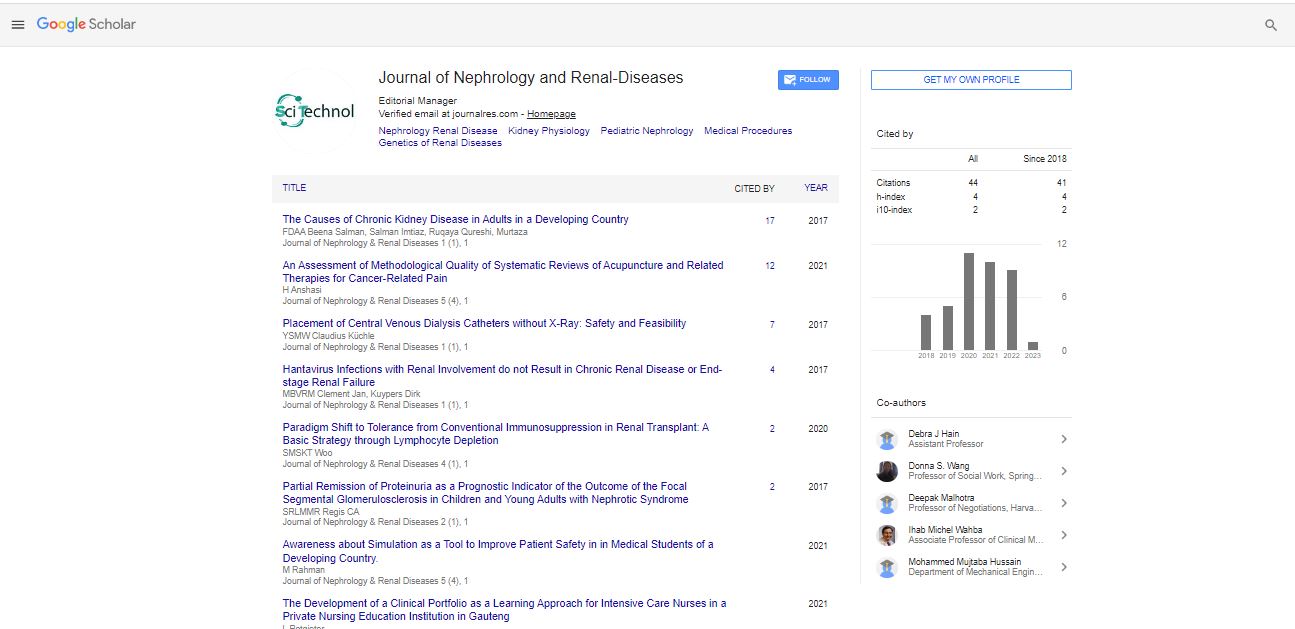Acid base balance in Chronic Kidney Disease
Shamim Ahmed
Kidney Foundation Hospital and Research Institute, Bangladesh
: J Nephrol Ren Dis
Abstract
Normal metabolism of the body produces approximately 15000 mmol of carbon dioxide and 50 to 100 mmol of non-volatile or fixed acid each day. Acid base balance is maintained by normal elimination of carbon dioxide by lungs and normal excretion of non-volatile acid by kidneys. Metabolic acidosis occurs when either an increase in production of non-volatile acid or increase loss of bicarbonate from the body overwhelms the mechanism of homeostasis or when renal acidification mechanism is compromised. Metabolic acidosis (chronic) is commonly associated with Chronic Kidney Disease (CKD). The number of functioning nephrons declined in CKD, acid excretion is initially maintained by an increase in ammonium excretion. However, total ammonium excretion begins to fall when Glomerular Filtration rate (GFR) is below 40 ml/min. CKD leads to retention of hydrogen ion which is buffered by bicarbonate in the extra cellular fluid, tissue buffer and bone. With worsening of renal function progressive metabolic acidosis and academia develop. Serum bicarbonate concentration is <22 meq/L is about 25% patient of non-dialysis dependent CKD stage-5. Serum bicarbonate trends to stabilize 12 to 18 meq/L in CKD when GFR is <10 ml/min. Anion gap remains normal until late stage CKD when it begins to widen due to retaining anion such as phosphate and sulfate. The consequences in CKD are bone resorption and osteopenia, increase muscle protein catabolism, aggravation of secondary hyperparathyroidism, reduced respiratory reserve, exhaustion body buffer system, increase severity of acute intercurrent illness, reduce Na-K-ATPase activity in RBC, myocardial cells resulting impair myocardial contractility, producing heart failure, systemic inflammation and hypotension. Endocrine disorder in metabolic acidosis in CKD is resistance to growth hormone and insulin and hypertriglyceridemia. African American Study of Kidney disease (AASK) trial and CRIC observational study in patients of non-dialysis depended CKD have found that lower serum bicarbonate concentration, higher net endogenous acid production, higher dietary acid load and inability to excrete acid are all associated with a higher risk of progressive renal function loss. Potential mechanism for progression of CKD is metabolic acidosis promotes increase of ammonium excreted per nephron is associated with activation of complement system, renin angiotensin system with increase production of endothelin which may produce tubulointerstitial inflammation and chronic damage to kidneys. Treatment of metabolic acidosis in CKD is by sodium bicarbonate or sodium citrate. In mild acidemia (arterial pH >7.2) in asymptomatic adult does not require bicarbonate therapy. KDIGO guideline advocate alkali therapy in patient with CKD in a dose 0.5 to 1 mg per/kg/ day to maintain target range 23-28 meq/L. Sodium citrate should be avoided in patient also taking aluminum containing antacid. Sodium bicarbonate therapy may cause volume expansion and hypertension in CKD patients and raising pH can precipitate tetany in patient with hypocalcaemia. Bicarbonate supplement appears to slow the progression of CKD, prevent or delay the progression of both osteopenia and hyperparathyroid bone disease and improved nutritional status and lean body mass. In conclusion several but not all studies of patients with chronic metabolic acidosis in CKD have demonstrated bicarbonate therapy improves or decrease the progression of bone disease, normalizes growth, reduce muscle degradation, improves of albumin synthesis and retards progression of CKD. At present recommendation is to maintain bicarbonate level 22-23 mmol/L in CKD patients.
Biography
Shamim Ahmed is the Life Member of Bangladesh Renal Association, Association of Physicians of Bangladesh, Teachers Association, Rajshahi Medical College, Teacher Association, Dhaka Medical College, Bangladesh Medical Association, Kidney Kollan Somity and BCPS and Secretary General of Bangladesh Renal Association. He has 90 publications in different medical journals and 10 publications in different newspapers, periodicals in Bengali language.
E-mail: professorshamim@gmail.com
 Spanish
Spanish  Chinese
Chinese  Russian
Russian  German
German  French
French  Japanese
Japanese  Portuguese
Portuguese  Hindi
Hindi 
